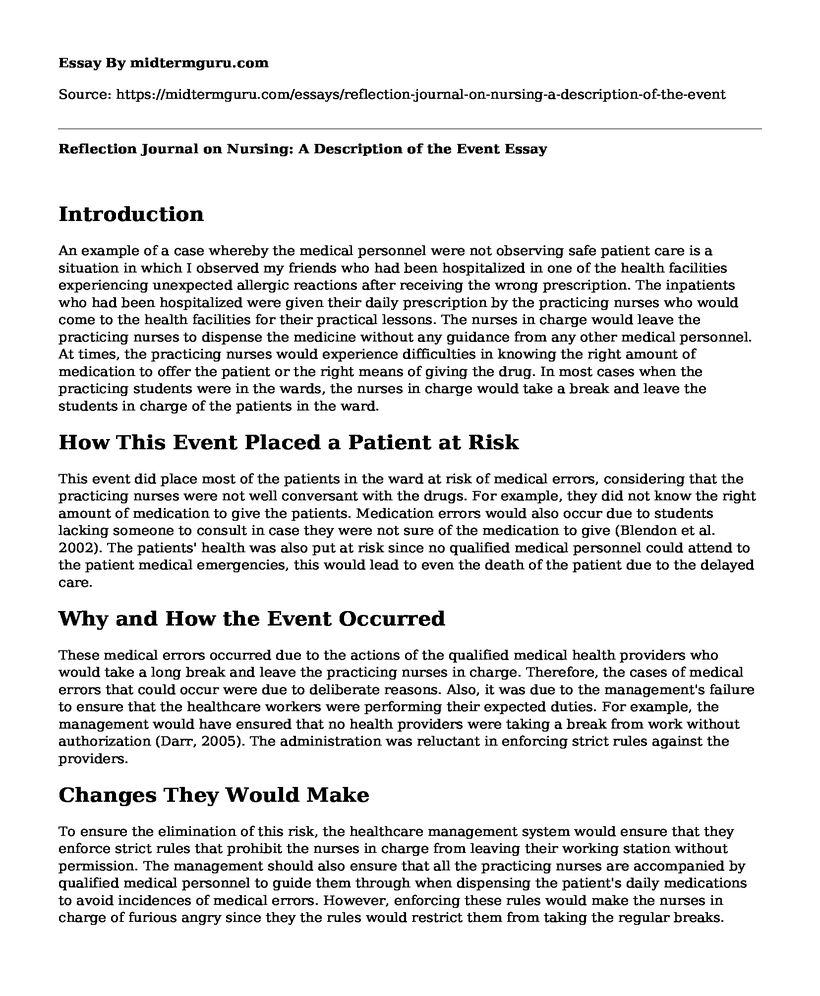Introduction
An example of a case whereby the medical personnel were not observing safe patient care is a situation in which I observed my friends who had been hospitalized in one of the health facilities experiencing unexpected allergic reactions after receiving the wrong prescription. The inpatients who had been hospitalized were given their daily prescription by the practicing nurses who would come to the health facilities for their practical lessons. The nurses in charge would leave the practicing nurses to dispense the medicine without any guidance from any other medical personnel. At times, the practicing nurses would experience difficulties in knowing the right amount of medication to offer the patient or the right means of giving the drug. In most cases when the practicing students were in the wards, the nurses in charge would take a break and leave the students in charge of the patients in the ward.
How This Event Placed a Patient at Risk
This event did place most of the patients in the ward at risk of medical errors, considering that the practicing nurses were not well conversant with the drugs. For example, they did not know the right amount of medication to give the patients. Medication errors would also occur due to students lacking someone to consult in case they were not sure of the medication to give (Blendon et al. 2002). The patients' health was also put at risk since no qualified medical personnel could attend to the patient medical emergencies, this would lead to even the death of the patient due to the delayed care.
Why and How the Event Occurred
These medical errors occurred due to the actions of the qualified medical health providers who would take a long break and leave the practicing nurses in charge. Therefore, the cases of medical errors that could occur were due to deliberate reasons. Also, it was due to the management's failure to ensure that the healthcare workers were performing their expected duties. For example, the management would have ensured that no health providers were taking a break from work without authorization (Darr, 2005). The administration was reluctant in enforcing strict rules against the providers.
Changes They Would Make
To ensure the elimination of this risk, the healthcare management system would ensure that they enforce strict rules that prohibit the nurses in charge from leaving their working station without permission. The management should also ensure that all the practicing nurses are accompanied by qualified medical personnel to guide them through when dispensing the patient's daily medications to avoid incidences of medical errors. However, enforcing these rules would make the nurses in charge of furious angry since they the rules would restrict them from taking the regular breaks.
Situation Awareness
The health providers were aware of what was going on in the hospital wards during the entire time I was looking after my friend who had been hospitalized, and they seemed to be okay with the practicing nurses dispensing the medication to the patients. However, the health providers noted the safety problem when the practicing nurse gave my friend the wrong medication that is the time the health providers came to check what was going on and they tried to act very concerned. This event affected me since it made me traumatized to see my friend experiencing the unexpected body reaction due to the wrong medication. Based on the case that occurred I learnt that there is need to take caution when giving medication to the patient and the practicing nurses should always be guided when performing their duties (Flores et al. 2003). Therefore, in the future during my nursing profession career, I will ensure that I take great caution to ensure the patient's safety is upheld.
References
Blendon, R. J., DesRoches, C. M., Brodie, M., Benson, J. M., Rosen, A. B., Schneider, E., ... & Steffenson, A. E. (2002). Views of practicing physicians and the public on medical errors. New England Journal of Medicine, 347(24), 1933-1940.
Darr, K. (2005). Ethics in health services management. Journal For Healthcare Quality, 27(3), 55.
Flores, G., Laws, M. B., Mayo, S. J., Zuckerman, B., Abreu, M., Medina, L., & Hardt, E. J. (2003). Errors in medical interpretation and their potential clinical consequences in pediatric encounters. Pediatrics, 111(1), 6-14.
Cite this page
Reflection Journal on Nursing: A Description of the Event. (2022, Oct 25). Retrieved from https://midtermguru.com/essays/reflection-journal-on-nursing-a-description-of-the-event
If you are the original author of this essay and no longer wish to have it published on the midtermguru.com website, please click below to request its removal:
- Executive Summary on Hospital Readmission - Paper Example
- Research Paper on Pregnant Women in Prison
- Essay Sample on Prevention of Falls
- Iron Deficiency in Elderly: Investigating Prevalence and Consequences - Research Paper
- County Health Rankings: Grading US Counties on Health Status - Essay Sample
- Nurse Leadership: Essential Competencies for Success in Healthcare - Essay Sample
- Hydration Status: Examining Body Weight & Urine Indices - Research Paper







